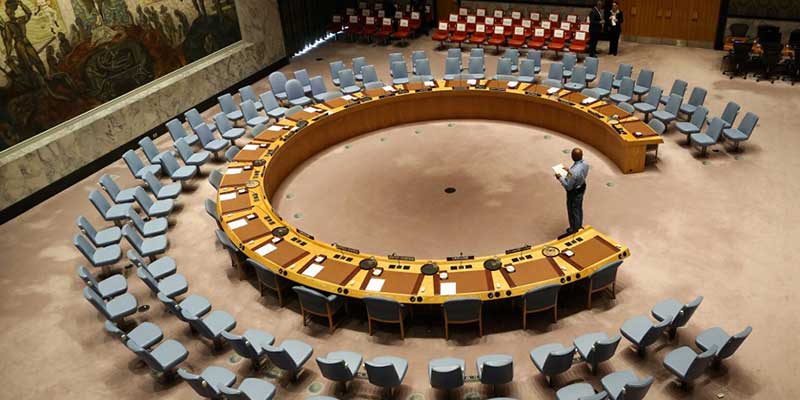- World
- Dec 15
Explainer / Veto power in the UNSC
The UN Security Council rejected a draft resolution that would have integrated climate‑related security risk as a central component of United Nations conflict‑prevention strategies aiming to help counter the risk of conflict relapse.
In a recorded vote of 12 in favour to two against (India, Russia), with one abstention (China), the Council rejected the draft as a permanent member (Russia) vetoed the resolution.
UN Security Council
• The United Nations Charter established six main organs of the United Nations, including the Security Council. It gives primary responsibility for maintaining international peace and security to the Security Council.
• All members of the United Nations agree to accept and carry out the decisions of the Security Council. While other organs of the United Nations make recommendations to Member States, only the Security Council has the power to make decisions that member states are then obligated to implement under the Charter.
• The Security Council held its first session on January 17, 1946 at Church House, Westminster, London. Since its first meeting, the Security Council has taken permanent residence at the United Nations Headquarters in New York City.
• A representative of each of its members must be present at all times at UN Headquarters so that the Security Council can meet at any time as the need arises.
• The Security Council takes the lead in determining the existence of a threat to the peace or act of aggression.
• It calls upon the parties to a dispute to settle it by peaceful means and recommends methods of adjustment or terms of settlement.
• In some cases, the Security Council can resort to imposing sanctions or even authorise the use of force to maintain or restore international peace and security.
• The Council is composed of 15 members.
• Five permanent members are: China, France, Russian Federation, the United Kingdom, and the United States.
• Ten non-permanent members are elected for two-year terms by the General Assembly.
The right to veto
• The creators of the United Nations Charter conceived that five countries — China, France, the USSR (which was succeeded in 1990 by the Russian Federation), the United Kingdom and the United States — because of their key roles in the establishment of the United Nations, would continue to play important roles in the maintenance of international peace and security.
• They were granted the special status of Permanent Member States at the Security Council, along with a special voting power known as the “right to veto”.
• It was agreed by the drafters that if any one of the five permanent members cast a negative vote in the 15-member Security Council, the resolution or decision would not be approved.
• All five permanent members have exercised the right of veto at one time or another. If a permanent member does not fully agree with a proposed resolution but does not wish to cast a veto, it may choose to abstain, thus allowing the resolution to be adopted if it obtains the required number of nine favourable votes.
Who proposed the new resolution?
Co‑sponsored by Niger and Ireland, the draft would have requested the Secretary‑General to integrate climate-related security risk as a central component into comprehensive conflict-prevention strategies of the United Nations, to contribute to the reduction of the risk of conflict relapse due to adverse effects of climate change.
Members of the Council, speaking before and after the vote, expressed disagreement on the content of the resolution, the consensus process and the very notion that it should appear on that organ’s agenda.
Why India opposed the resolution?
India’s Permanent Representative to the United Nations T.S. Tirumurti stressing that India was “second to none” when it comes to climate action and climate justice, stated that the Council is not the place to discuss either issue. In fact, the attempt to do so appears to be motivated by a desire to evade responsibility in the appropriate forum, he said.
Detailing the Indian government’s climate‑action vision and efforts towards this end, he said that affordable access to climate finance and technologies has become critical.
Underscoring that developed countries have fallen well short of their promises, he pointed out that the attempt to link climate with security seeks to obfuscate a lack of progress on critical issues under the United Nations Framework Convention on Climate Change (UNFCCC) process.
The text would constitute a step backward from collective resolve to combat climate change and would hand responsibility to a body that neither works through consensus nor is reflective of the interests of developing countries, he said.
Manorama Yearbook app is now available on Google Play Store and iOS App Store



